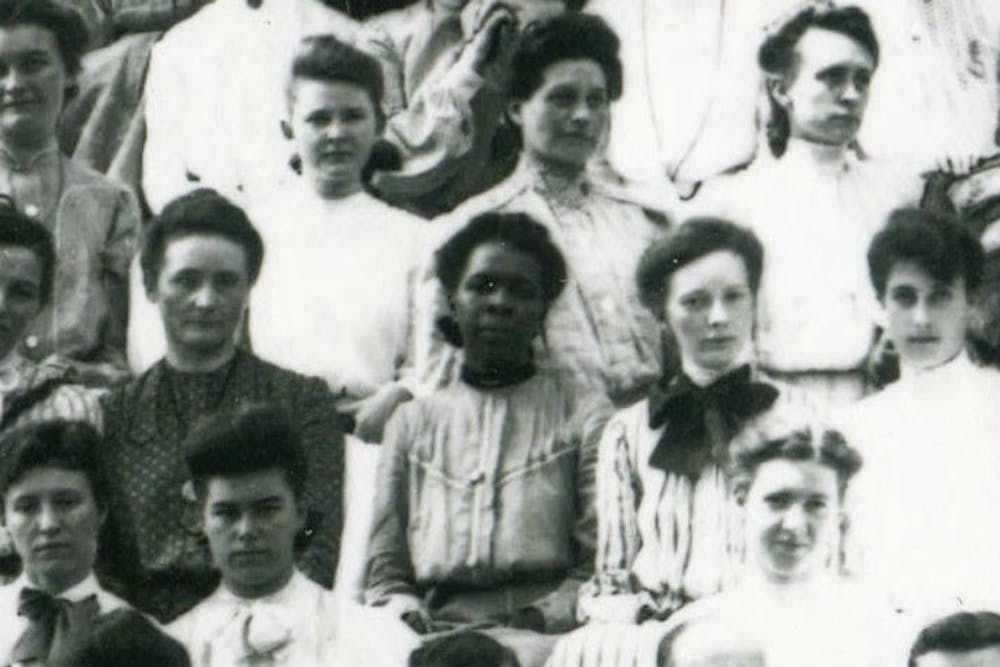By Tess Sohngen, Senior Staff Writer
When Nellie Craig became the first African-American woman to enroll at Miami in 1903, she broke down barriers and made university history. Craig paved the way for other women of color, but, even today, the university is characterized by its lack of racial diversity.
Nellie Craig, early 1900s
Nellie Craig became the first full-time African-American to graduate from Miami's College of Education, then the Ohio State Normal College in Oxford, during a time when segregation was still implemented in the Oxford community.
Craig grew up in Oxford in a family of six, and her grandfather served in the Civil War. Her mother had given birth to nine children, but only four survived, including Nellie and her sister Elizabeth, a published and accredited poet.
In Elizabeth's poetry book, "Mother's Training," she describes their mother as an optimistic, pious and ambitious woman who inspired Elizabeth to be a devout Christian and write poetry. Their mother's influence on Nellie's college and career accomplishments are unknown, but when Miami University first opened enrollment to colored students in the early 1900s, Nellie was one of the first to attend.
Attending a mixed school in Oxford was still a tense and contested change. Black and white students had been attending separate schools located only half a mile apart until a new, larger school building opened in 1887. When the Oxford School Board denied admission to all students, a local black parent filed and won a lawsuit in the Butler County Circuit Court, which the school board appealed. The desegregation decision was soon upheld by the Ohio Supreme Court, integrating the system in 1887, but backlash from the white community persisted for a brief time.
Craig broke down another racial barrier by becoming the first African-American to student-teach in the Oxford public school system to mixed race classrooms, whereas most African-American student teachers were assigned to predominantly black school systems. She taught elementary students in nearby Indiana until she married James Walter and moved to Cleveland in 1911.
2016
"She paved the way for us here at Miami," said Whitney Felder, the president of Miami's Black Student Action Association (BSAA), the largest minority organization on campus.
The BSAA named its office space in Armstrong after Nellie.
Although African-American enrollment at Miami increased prior to World War II, Miami policy prohibited African-Americans from living on campus at that time, except male athletes.
The Oxford campus was first integrated in 1945, when Myldred Boston and Arie Parks were assigned to a basement room between the smoking room and the furnace room. Boston moved out to live with a family in Oxford, and Parks did not return after that year.
For the last 40 years, Miami has consistently ranked the lowest among Ohio colleges for minority student enrollment: 2.8 percent in 1976, 2.5 percent in 1981 and 2.6 percent in 1992. African American students continue to be underrepresented on campus, making up only 2.9 percent of the 2015 fall enrollment in Oxford. Caucasians and unknown make up 76.3 percent of that enrollment.
Felder said that members of her organization have often felt underrepresented or like they do not belong at Miami.
"This was a very big culture shock when I got here because I felt alone," said Felder.
Since her first year, she has found comfort in the BSAA community she lacked in the general Oxford student community.
Junior Damon Washington, a running-back for Miami's football team, found a sense of community and lifelong friendship through the football team and other students.
Despite coming from a small and predominantly white high school, he feels students are not aware of the lack of diversity on campus and don't pay attention to the current issues.
Felder attributes the problems African-American students at Miami face to the level of student ignorance about diversity.
"I think there's a lot of closed-mindedness at Miami," said Felder.

